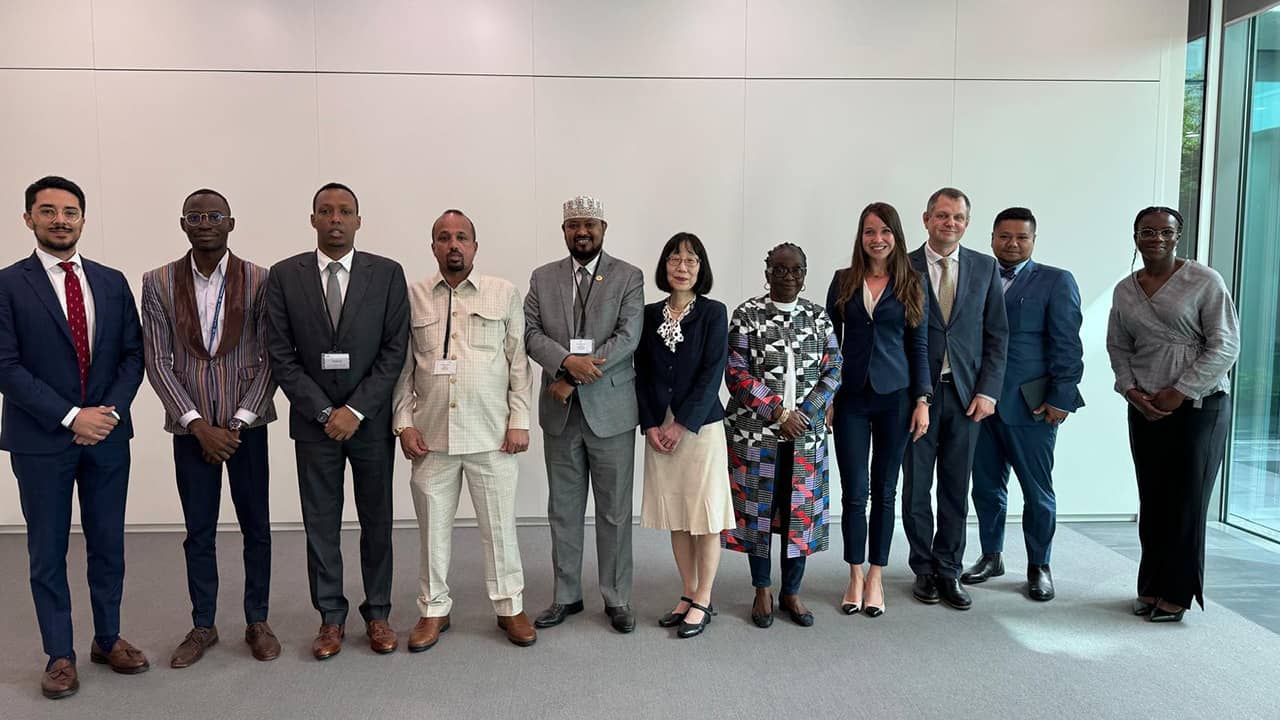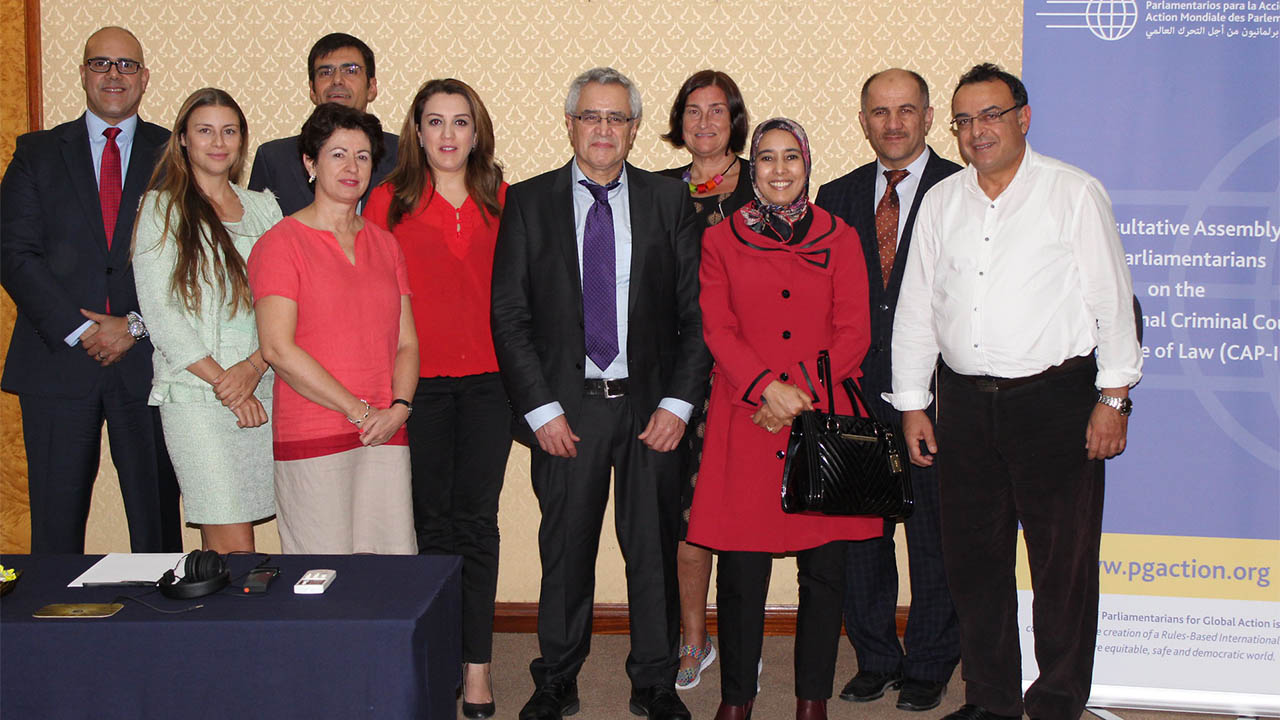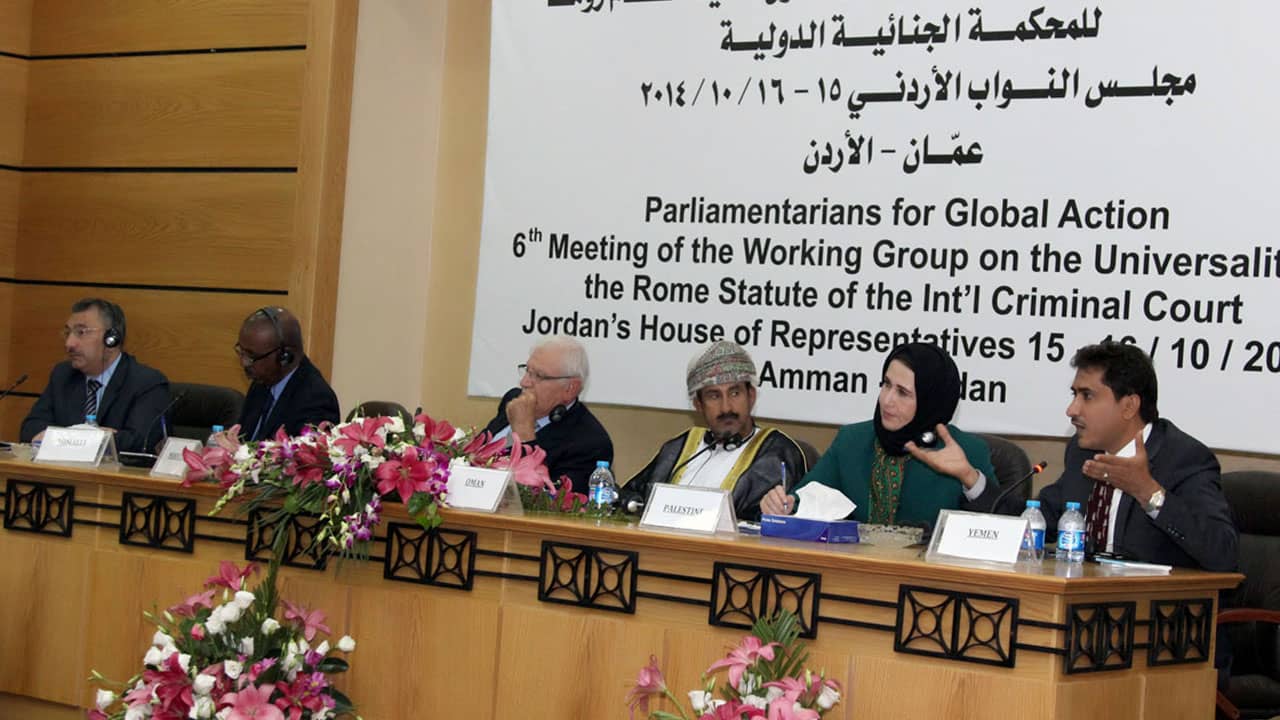Depuis plus de 30 ans, la Somalie subit des cycles récurrents de violence armée, d’insécurité et d’instabilité, créant un environnement propice à la perpétration d’atrocités et d’attaques contre les civils. Dans ce contexte, il existe un besoin immense de mettre en œuvre le principe de responsabilité dans le pays et de favoriser le respect du droit international. Dès lors, PGA s’engage activement avec ses membres en Somalie afin d’encourager le processus d’adhésion au Statut de Rome et de promouvoir l’État de droit. En mobilisant la détermination politique de ses membres parlementaires, PGA offre un soutien technique complet pour faciliter cet objectif crucial.
Le travail étroit de PGA avec la Somalie a commencé en 2014 avec la participation de deux députés à la 6e réunion du Groupe de travail de PGA sur l’universalité du Statut de Rome de la Cour pénale internationale au Moyen-Orient et en Afrique du Nord (disponible en anglais). Lors de cette réunion, M. Abdirahman Hosh Jibril, ancien ministre des Affaires constitutionnelles et de la Réconciliation du gouvernement fédéral de transition de la Somalie et membre de PGA, a confirmé son engagement à lancer le processus de ratification en Somalie, en sensibilisant et en créant une volonté politique au sein de l’opinion publique, du Parlement et du gouvernement – soulignant ainsi l’impératif pour la Somalie de rejoindre le système du Statut de Rome, notamment en vue des attaques continues d’Al-Shabab contre la population. De plus, M. Abdi Ali Hassan, alors président de la Commission électorale nationale et membre de PGA, a souligné le fait que créer une alliance étroite avec les organisations de la société civile somalienne et internationale était une priorité pour adhérer au Statut de Rome.
La visite à la CPI en 2022 (disponible en anglais) du président du Parlement fédéral de Somalie, S.E. Adan Mohamed Nuur Madobe, a présenté de nouvelles opportunités et le renouvellement de l’engagement somalien envers l’adhésion au Statut de Rome. Par la suite, la CPI a demandé l’assistance technique de PGA dans ce processus et a directement engagé le conseiller spécial du président du Parlement pour les relations interparlementaires de l’époque, M. Mahad Haji, pour promouvoir l’adhésion au Statut de Rome. En mars 2023, le Secrétariat de PGA a envoyé à M. Haji un modèle d’instrument d’adhésion et une note explicative sur la ratification et les amendements du Statut de Rome, tels qu’élaborés par PGA.
En outre, en avril 2023, PGA a facilité une réunion entre M. Haji et la procureure adjointe de la CPI, Mme Nazhat Shameem Khan, pour discuter des moyens de faire avancer l’adhésion, lutter contre les idées reçues sur le Statut de Rome et s’engager avec les co-facilitateurs sur l’universalité de la Cour pénale internationale – les Pays-Bas et la République de Corée – afin d’obtenir leur assistance. Après les discussions, les Pays-Bas ont facilité la traduction du Statut de Rome en somali – traduction qui a ensuite été partagée avec les parties prenantes concernées, y compris les parlementaires et les fonctionnaires du gouvernement dans le pays.
Lors de la 22e session de l’Assemblée des États Parties, qui s’est tenue du 4 au 14 décembre 2023, PGA a invité l’honorable Marwa Abdibashir Hagi, députée de Somalie, à une table ronde sur le thème « Pourquoi l'universalité compte : l’importance de ratifier le Statut de Rome, ses amendements et l’Accord sur les privilèges et immunités » (disponible en anglais). L’événement a souligné le besoin crucial de ratification et de mise en œuvre universelle du Statut de Rome comme étape essentielle pour tenir les auteurs d’atrocités responsables de leurs actes. Après l’événement, PGA a facilité une réunion bilatérale entre Mme Hagi et le président de la CPI de l’époque, S.E. Piotr Hofmański, au cours de laquelle Mme Hagi a réaffirmé que le Parlement fédéral était déterminé à faire avancer le processus d’adhésion dans le pays, malgré la situation politique actuelle.
En janvier 2024, plusieurs membres de PGA en Somalie ont présenté un projet de loi d’adhésion au président du Parlement pour son inclusion à l’ordre du jour de la prochaine session parlementaire. Le projet de loi a néanmoins été rejeté pour des raisons de procédure. Suite à ce revers, le Secrétariat de PGA a rédigé une lettre explicative pour souligner l’importance du système du Statut de Rome, qui a ensuite été partagée avec les 275 membres du Parlement, y compris le président et les vice-présidents. Pour continuer à sensibiliser et aider à faire avancer le processus d’adhésion, PGA a organisé la visite d’une délégation parlementaire de haut niveau de la République fédérale de Somalie à la CPI (disponible en anglais) et à d’autres institutions internationales à La Haye.
| Signature, Ratification du/Accession au Statut de Rome de la CPI | |
|---|---|
| Date de signature : | pas encore signé. |
| Date de ratification : | pas encore ratifié. |
| Amendements au Statut de Rome | |
|---|---|
| Ratification de l’amendement de Kampala à l’article 8 du Statut de Rome relatif aux crimes de guerre [utilisation de poison et de balles qui s’épanouissent et s’aplatissent en temps de CANI] (2010) : | Non |
| Ratification des amendements de Kampala sur le crime d’agression reflété à l’article 8 bis du Statut de Rome (2010) : | Non |
| Ratification de l’amendement à l’article 124 du Statut de Rome (2015) : | Non |
| Ratification de l’amendement à l’article 8 du Statut de Rome sur les crimes de guerre [armes biologiques] (2017) : | Non |
| Ratification de l’amendement à l’article 8 du Statut de Rome sur les crimes de guerre [armes à laser aveuglant] (2017) : | Non |
| Ratification de l’amendement à l’article 8 du Statut de Rome sur les crimes de guerre [fragments indétectables] (2017) :/td> | Non |
| Ratification de l’amendement à l’article 8 sur les crimes de guerre [fait d’affamer délibérément des civils en temps de CANI] (2019) : | Non |
| Adoption de mesures législatives afin de mettre en œuvre le Statut de Rome de la CPI | |
|---|---|
|
La législation somalienne ne définit pas les principaux crimes prévus par le Statut de Rome. Il n’existe aucune référence aux principes généraux du droit pénal international, ni de dispositions concernant la coopération avec la CPI. |
|
| Accords de coopération | |
|---|---|
| Ratification de l’Accord sur les privilèges et immunités de la CPI (APIC) : | Non. |
| Signature de l’Accord sur l’exécution des peines avec la CPI : | Non. |
| Signature de l’Accord sur la mise en liberté provisoire et définitive avec la CPI : | Non. |
| Signature de l’Accord d’immunité bilatéral avec les États-Unis : | Non. |










